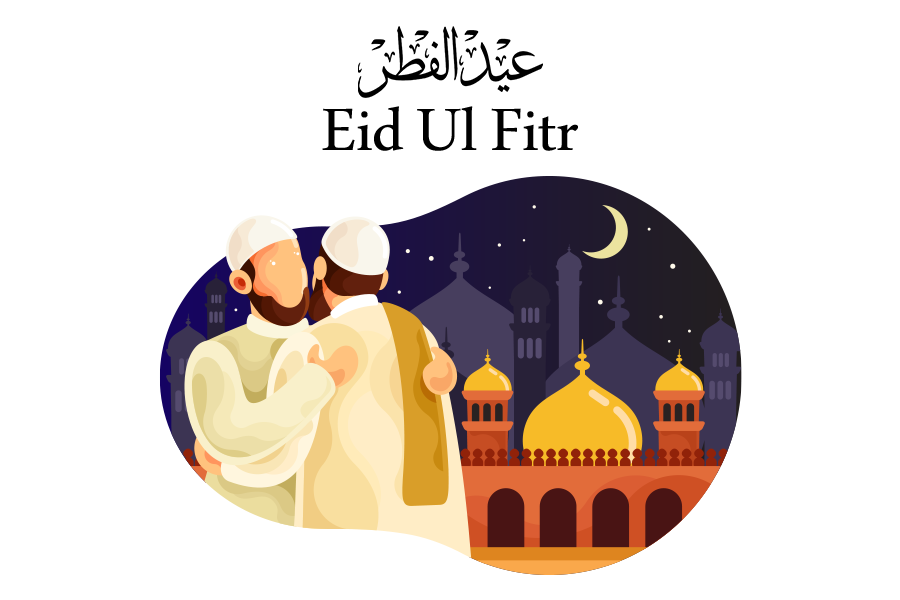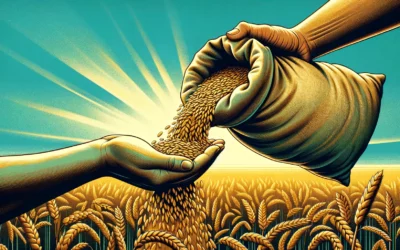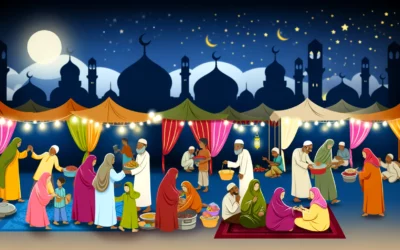Eid ul Fitr is a vital celebration in the Islamic schedule and was begun by the Prophet Muhammad himself. It will be celebrated on the 1st or 2nd of May,2022. It is called ‘The Feast of Breaking the Fast’ and is praised by Muslims overall to stamp the finish of Ramadan.
Many Muslims asked questions that fasting on Eid ul Fitr allowed? What does Islam say about fasting on Eid ul Fitr? It is prohibited to fast on the Day of Eid, and particular prayer is nominated for this day. As a required demonstration of good cause, charity to poor people and the needy (Zakat-ul-Fitr) before the ‘Eid’ prayer.
What are the two types of Eid?
In lunar Calendar, there are two Eids that Muslim celebrate,
- Eid al-Fitr – which signifies ‘the festival of the breaking of the fast – is celebrated at the end of Ramadan on the first of Shawwal, a month when many Muslims fast.
- Eid al-Adha – which means ‘feast of the sacrifice’ – is celebrated in the remembrance of Prophet Ibrahim (AS) and Prophet Ismail (AS) on the occasion of Hajj, when many Muslims perform the Hajj pilgrimage.
How to celebrate Eid ul fitr 2022?
Indeed Eid ul Fitr is a day of joy for all of us, but Eid ul Fitr is not all about dressing up in fine new clothes, eating delicious treats and pursuing carnal pleasures and delights. In its outward celebration, Eid ul Fitr is meant to symbolize the acceptance of acts of worshipful obedience; the remission of sins and mistakes; the conversion of evil deeds into good deeds; the glad tidings of promotion to higher spiritual degrees and the conferring of robes of honor, gifts and gracious favors. Eid should be celebrated, but together with celebrating it, we should also remember Allah. Whether there is happiness or sadness, one should never forget him; just as Prophet Muhammad (S.A.W.) has said,
“The people who will be called towards Paradise first on the Day of Judgment are those who praised Allah Ta’ala during happiness and sadness.”
What are the Sunnah’s to celebrate Eid ul Fitr?
Prophet Muhammad (S.A.W.) is the best example for humankind. Every act of Prophet Muhammad (S.A.W.) is called Sunnah. Here we discuss some sunnah ways to celebrate Eid ul Fitr and some other good deeds to do :
1 ) Wake up early, offer fajar, and prepare for Eid day.
2 ) Take a bath and dress in clean clothes, Prepare for personal cleanliness, care for clothing details, etc.
3) use perfume or fragrance.
4) Give Zakat al Fitr to the needy before Salat-al-Eid.
5) One should not come out to the prayer place on Eid ul Fitr before eating some dates because of the hadeeth narrated by al-Bukhaari from Anas ibn Maalik who said:
“The Messenger of Allah (peace and blessings of Allah be upon him) would not go out on the morning of Eid ul Fitr until he had eaten some dates… and he would eat an odd number.” (Bukhaari, 953)
6) Offer Salah early in the morning in an Eid Gah with other Muslims. Listen to the Khutbah. Take your family members with you.
7) Walk to the Eid Gah and take a different home route.
Jaabir ibn’ Abd-Allah (may Allah be pleased with him) reported that the Prophet (peace and blessings of Allah be upon him) used to vary his routes on the day of Eid. (Bukhaari)
8) Go to the Eid Gah calmly, relaxed and dignified, with the gaze lowered.
9) Hug and greet people. This festival has a feeling of brotherhood in it. All the persons hug each other on this day regardless of caste or creed
10) Eid prayer consists of a sermon followed by a short congregational prayer. So, After the prayers, start visiting your relatives, eat sweets and ‘sewiah’, give gifts to children, donate something to the poor and needy and shower blessings and love upon everybody.
11)Involve children and females in the family too.
12) Try to share your festivity with as many people as possible. Joy is to be shared; happiness multiplies if you share it.
What is Zakat Al-Fitr?
Zakat Al-Fitr is an obligatory charity at the end of Ramadan. Zakat al Fitr should be given in Ramadan but before the Eid ul Fitr Prayers. The Prophet (P.B.U.H.) urged every Muslim, whether Male or Female, young or old, to pay Zakat al-Fitr at the end of Ramadan.
Zakat al-Fitr should be given at the end of Ramadan. One should not delay it until after the Eid ul Fitr Prayers.
Ibn Abas (R.A.) narrated that the Prophet (P.B.U.H.) said:
“Whoever gives Zakat ul-Fitr before the prayers, it is accepted Zakah. and whoever gives it after the prayer, it is a kind of charity.” (Abu Dawood)
The companions of the Prophet (P.B.U.H.) used to give Zakat al-Fitr one or two days before the Eid.
What is the amount of Zakat al-Fitr?
The amount of Zakat al-Fitr is one Sa’ (2.176 kilograms or about 5 pounds) of dates or barley, and it should be given on behalf of every member of the family. It is better to give it in the form of food instead of money.
Ibn `Umar (R.A.) said:
“The Prophet (P.B.U.H.) enjoined the payment of one Sa` of dates or one Sa` of barley as Zakat Al-Fitr on every Muslim, young and old, male and female, free and enslaved person.” (Muslim)
Narrated by Abu Saeed (R.A.)
“We used to give Zakat al-Fitr on behalf of every child, aged person, free man or slave during the lifetime of the Prophet (P.B.U.H.), one Sa’a of food, or one Sa’a of dried yoghurt, or one Sa’a of barley, or one Sa’a of dates, or one Sa’a of raisins”. (Muslim)
What is the purpose of Zakat al-Fitr?
The primary purpose of Zakat al-Fitr is to expiate for any mistakes or wrongdoings a person has done during Ramadan. Also, it is a means to help the poor and needy people.
Narrated by Ibn Abbas(R.A.) :
“The Prophet (P.B.U.H.) enjoined Zakat al-Fitr as a purification for those who fasted from the idle or obscene talk, and to feed the poor”. (Abu Dawood)















